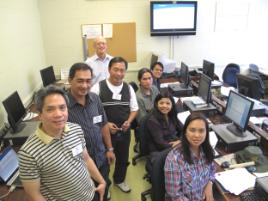Uni underpins Philippines' future property practices
Published on 10 June, 2009
Australian specialists are underpinning future property practices in The Philippines, helping to secure land tenure and create equitable valuations.
CQUniversity is facilitating the adaptation of its property degree for conditions in The Philippines, with a view to producing the next generation of property professionals in that country.

Professor Terry Boyd (rear) with the visiting property degree team
The project was tendered for as part of a wider World Bank and AusAid Land Administration and Management (LAMP) program.
CQU Adjunct Professor of Property Terry Boyd has previously worked as the International Advisor on Education Strategy and Professional Development on the LAMP Project Stage 2, focusing on 'Institutional Development and Capacity Building'. More details are available via: http://www.phil-lamp.org/
This month (June), Professor Boyd and other CQUniversity staff members have been hosting academic, government and business delegates who are developing postgraduate property programs at The University of the Philippines, Open University. The project team is spending 3 weeks in Rockhampton and 1 week in Brisbane.
Land administration refers to the processes of recording and disseminating information about the ownership, value and use of land. These processes include mapping and survey, identification of alienable and disposable lands, original and titling, transfer of title, land information and records, taxation, and land valuation.
The present Philippine land administration system was found to have serious legal and institutional defects in both structure and operations but it is proposed to merge all land administration agencies into a single Land Administration Authority (LAA).
Long-term benefits of this reform will include:
- Increased security of land tenure and eradication of fake and spurious titles;
- Convenient registration of land transactions at One-Stop-Shops in strategic regional and district-level locations;
- Faster land document registration with a target of same-day release;
- Cost recovery of land administration services through efficient operations and use of appropriate technology;
- Greater participation of all sectors of society in formal land registration;
- Equal access to, and equitable distribution of, land administration services by demand;
- Improved access to national land information within government and for the public as a result of unified land records;
- Increased public and investor confidence in the integrity of land titles in land markets
- Improved national survey control network and base mapping for national development.

